5 Top AI Courses for Supply Chain Managers in 2025
Discover the best AI courses tailored for supply chain managers in 2025. Enhance efficiency, streamline operations, and stay ahead of industry trends with cutting-edge training designed to revolutionize supply chain management through artificial intelligence.

In an era marked by technological advancements, artificial intelligence (AI) is becoming an essential tool across industries, and supply chain management is no exception. The integration of AI into supply chain operations is not just a trend but a pressing need. With AI's ability to enhance efficiency, reduce costs, and optimize decision-making processes, Supply Chain Managers are finding themselves at the crossroads of transformation. Upskilling in AI technologies is no longer optional but essential for those looking to remain competitive in their field. The potential job impact is significant, as AI technologies are poised to redefine roles and expectations, placing a premium on professionals who are equipped with the right skills.
Why AI matters for Supply Chain Managers today
AI's relevance in supply chain management has been growing at an unprecedented pace. Recent studies indicate that 69% of businesses are currently utilizing AI, highlighting its substantial penetration in the industry. The adoption of AI allows businesses to streamline operations, predict market trends, and enhance customer satisfaction. For Supply Chain Managers, understanding and leveraging AI is crucial to staying ahead. This article aims to guide professionals in identifying the best AI courses available, helping them gain the knowledge and skills necessary to excel in a tech-driven environment.
The Growing Role of AI in Supply Chain Managers
AI's applications in supply chain management are diverse and impactful. From automating routine tasks to facilitating data-driven decision-making and enabling personalized customer experiences, AI is reshaping the landscape of supply chain operations. Automation reduces the need for manual intervention, leading to faster and more accurate processes. Decision-making is enhanced by AI's ability to analyze vast datasets and provide actionable insights. Personalization, driven by AI algorithms, allows businesses to cater to individual customer needs more effectively. These applications are transforming how Supply Chain Managers approach their roles, driving efficiency and innovation.
Benefits of becoming an AI expert in Supply Chain Managers
For Supply Chain Managers, becoming proficient in AI offers numerous benefits. By acquiring AI skills, professionals can improve operational efficiencies, anticipate and mitigate risks, and drive strategic initiatives within their organizations. An AI-savvy Supply Chain Manager is better equipped to leverage data insights, optimize supply chain processes, and deliver superior results. Furthermore, expertise in AI can open doors to career advancement opportunities, as organizations increasingly seek leaders who can navigate the complexities of modern supply chain environments. This article will explore and compare six AI courses designed to equip Supply Chain Managers with the necessary skills, including the comprehensive offerings from CompleteAI Training.

Comparison: All AI Courses for Supply Chain Managers (Updated Q2' 2025)
| Course Name | Provider | Price | Key Topics | Pros | Cons | Best For |
|---|---|---|---|---|---|---|
| AI for Supply Chain Managers (Video Courses + Certifications) | Complete AI Training | $29/month (monthly), $8.25/month (annually) | Specialized video courses, AI tools, Industry news | Highest rating, Extensive courses, Daily updates, Affordable | Subscription based | General learners |
| Certified Generative AI for Supply Chain Management (GAISCM) | Global Skill Development Council (GSDC) | $100 | Generative AI, Demand forecasting, Inventory management | Globally recognized, Practical learning, Mentoring | Requires basic SCM knowledge | General learners |
| Strategic AI and Data Science for Supply Chain Management | The University of Sydney Business School | $1,280 (industry/government), $1,140 (alumni/GS1 members) | AI trends, Data strategies, No-code AI platforms | Practical content, Expert delivery, No coding required | High fees for some | General learners |
| Supply Chain Management: Leading with AI and Digital Transformation | MIT xPRO in collaboration with Emeritus | $2,800 (early registration: $2,492) | Digital supply chain frameworks, AI applications | MIT-backed, Expert faculty, Flexible format | High tuition, Time commitment | General learners |
| Artificial Intelligence (AI) in Procurement and Supply Chain Management Training Course | GLOMACS | $3,950 (online), $5,950 (classroom), $6,950 (New York 2025), $7,950 (New York 2026) | Supplier management, Contract optimization, Risk reduction | Strategic decision-making, Efficiency, Risk mitigation | Higher cost, Short duration | General learners |
Understanding AI Training for Supply Chain Managers Professionals
The integration of Artificial Intelligence (AI) in supply chain management has become increasingly important for professionals looking to optimize their operations. As AI continues to evolve, supply chain managers must keep up with the latest tools and strategies. This article provides a detailed comparison of various AI courses available for supply chain managers, focusing on their unique offerings, costs, and benefits.
Course 1: CompleteAI Training
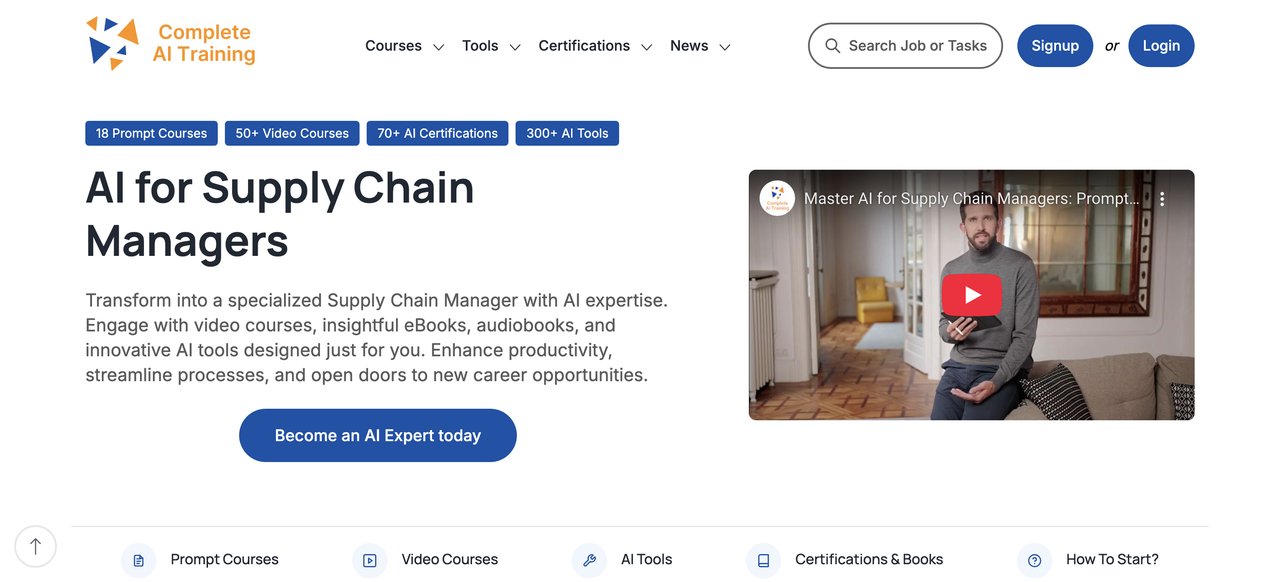
Complete AI Training for Supply Chain Managers offers a comprehensive library of over 100 specialized video courses and certifications. Designed for supply chain managers, this subscription-based service ensures continuous learning with daily updates on AI tools and industry news. The platform's affordability, especially with annual billing, makes it an attractive option for professionals seeking extensive AI education.
Key Topics Covered: AI education, latest AI tools, industry news.
Target Audience and Skill Level Requirements: Supply chain managers seeking ongoing AI education; no advanced AI skills needed.
- Pros:
- Highest rating and most complete offering for supply chain managers.
- Extensive range of courses and certifications.
- Daily updates on AI tools and news.
- Affordable pricing, especially with annual billing.
- Cons:
- Subscription-based, requiring continuous learning.
Who Would Benefit Most: Professionals looking for a comprehensive, affordable AI learning platform with continuous updates.
Course 2: Certified Generative AI for Supply Chain Management (GAISCM) by Global Skill Development Council (GSDC)
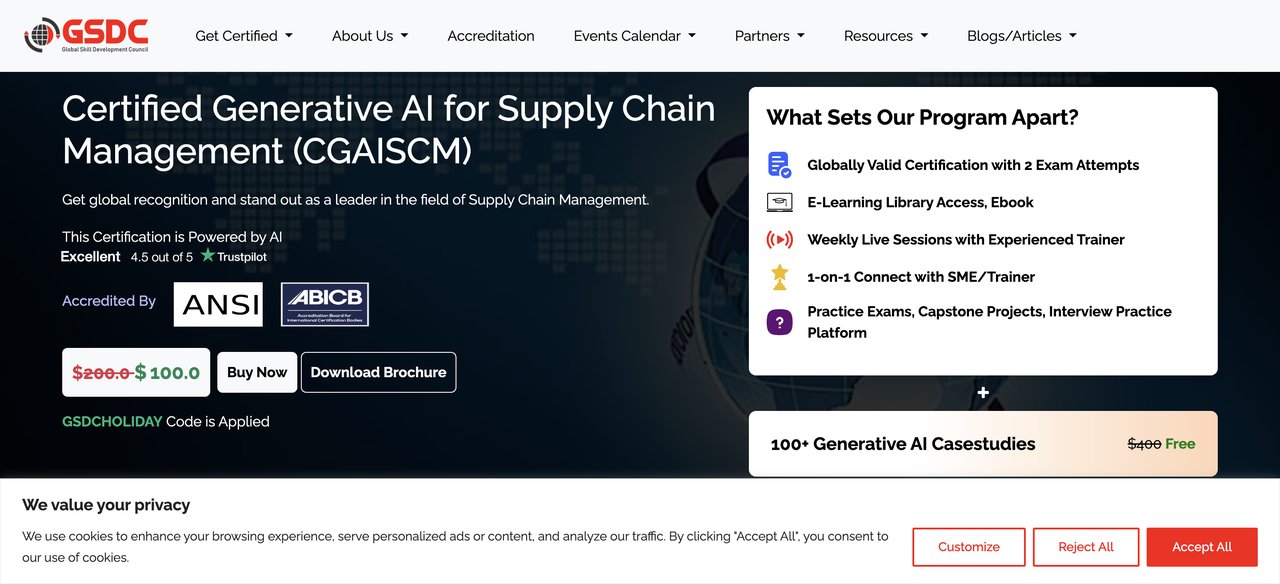
The Certified Generative AI for Supply Chain Management course by GSDC provides a globally recognized certification. It focuses on leveraging Generative AI to optimize supply chain operations, including demand forecasting, inventory management, and sustainability. The course includes hands-on projects and mentoring, making it a practical choice for supply chain professionals with basic SCM knowledge.
Key Topics Covered: AI-driven demand forecasting, inventory management, logistics, supplier performance, risk management, sustainability.
Target Audience and Skill Level Requirements: Supply chain professionals with basic SCM knowledge; no advanced AI skills needed.
- Pros:
- Globally recognized certification.
- Practical, hands-on learning with capstone projects.
- Personalized mentoring and live sessions.
- Covers ethical and compliance aspects of AI in supply chains.
- No expiry on certification.
- Cons:
- Requires basic knowledge of supply chain management.
Who Would Benefit Most: Professionals with a foundational understanding of supply chain management seeking practical AI applications and certification.
Course 3: Strategic AI and Data Science for Supply Chain Management by The University of Sydney Business School
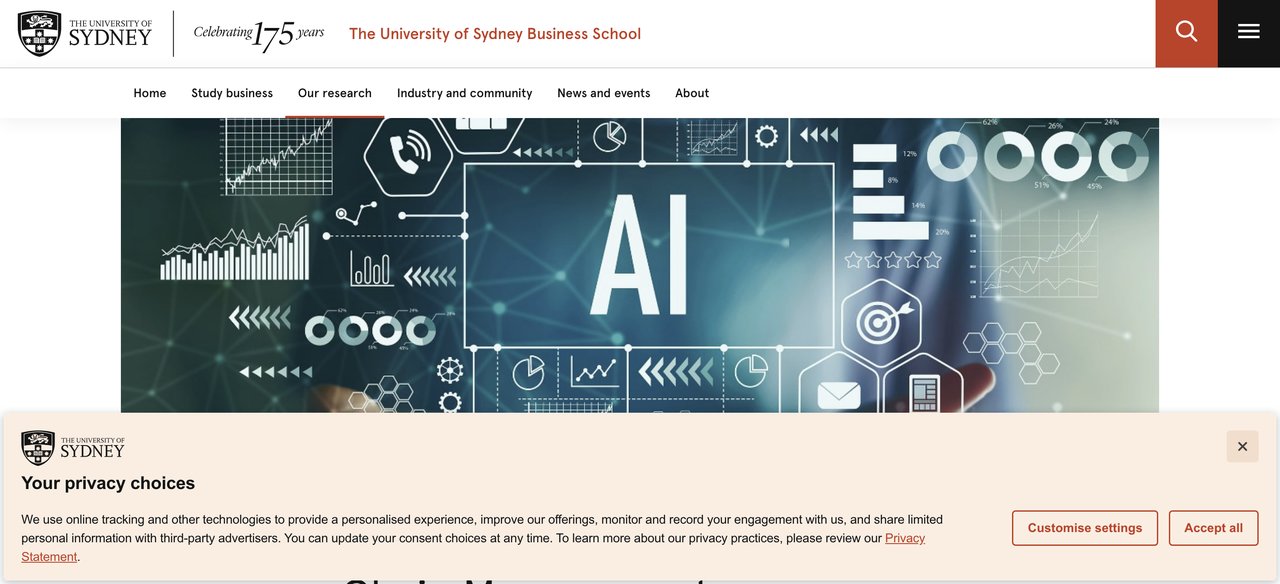
The Strategic AI and Data Science for Supply Chain Management course is a micro-credential offered by The University of Sydney Business School. It caters to business leaders and analytics champions in supply chain management, focusing on AI and data science trends, no-code AI platforms, and ethical considerations. The course provides real-world scenarios and flexible learning modes.
Key Topics Covered: AI and data science trends, enterprise data strategies, generative AI, no-code AI platforms, ethical considerations.
Target Audience and Skill Level Requirements: Business leaders and analytics professionals; no coding skills required.
- Pros:
- Practical and cutting-edge content.
- Delivered by AI and data strategy experts.
- No coding skills required.
- Opportunities for peer learning and collaboration.
- Flexible learning modes (live and self-paced).
- Cons:
- Course fees may be high for some individuals or small organizations.
- Refund policy includes a 10% administration fee before a set date and no refunds after.
Who Would Benefit Most: Business leaders and analytics professionals seeking strategic AI insights and flexible learning options.
Course 4: Supply Chain Management: Leading with AI and Digital Transformation by MIT xPRO in collaboration with Emeritus
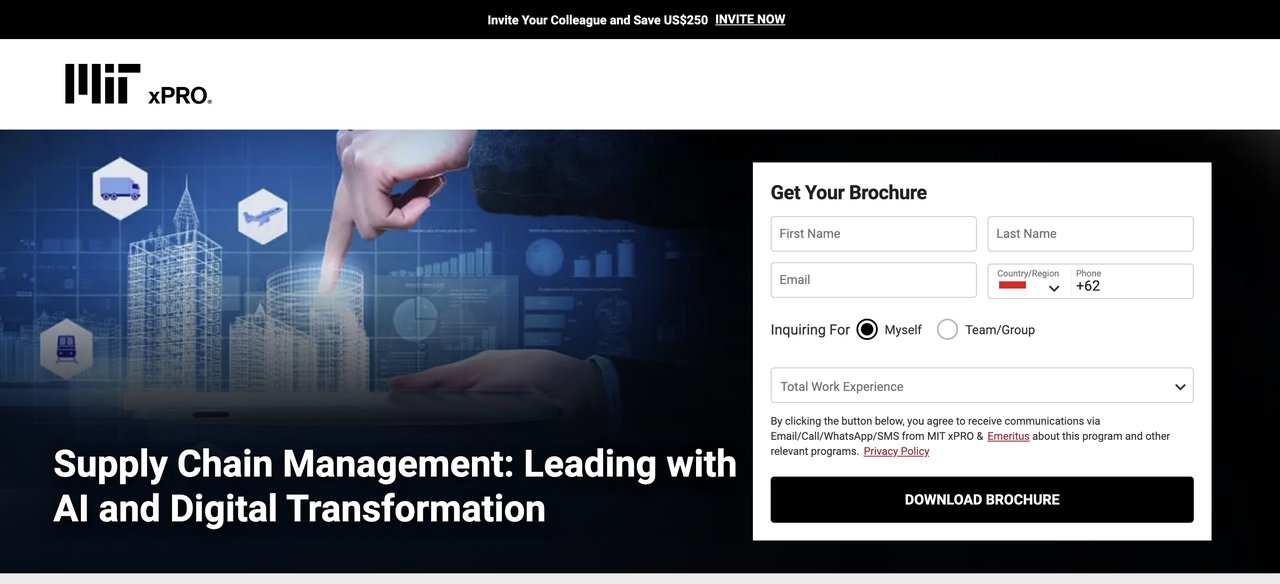
Supply Chain Management: Leading with AI and Digital Transformation is a 6-week online program offered by MIT xPRO. Designed for supply chain professionals and business leaders, the course covers digital supply chain frameworks and AI applications. It includes case studies and faculty sessions, providing a certificate from MIT xPRO.
Key Topics Covered: Digital supply chain frameworks, E2E visibility, analytics, AI applications, organizational change.
Target Audience and Skill Level Requirements: Supply chain professionals and business leaders; commitment of 4,6 hours per week for 6 weeks.
- Pros:
- High-impact, MIT-backed program with expert faculty.
- Focus on AI and digital transformation tailored for supply chain managers.
- Flexible online format with cohort-based learning.
- Financing and team discounts available.
- Certificate and CEUs to validate skills.
- Cons:
- Relatively high tuition cost (though discounts and payment plans are offered).
Who Would Benefit Most: Supply chain professionals and leaders looking for a reputable, intensive program with a focus on digital transformation.
Course 5: Artificial Intelligence (AI) in Procurement and Supply Chain Management Training Course by GLOMACS
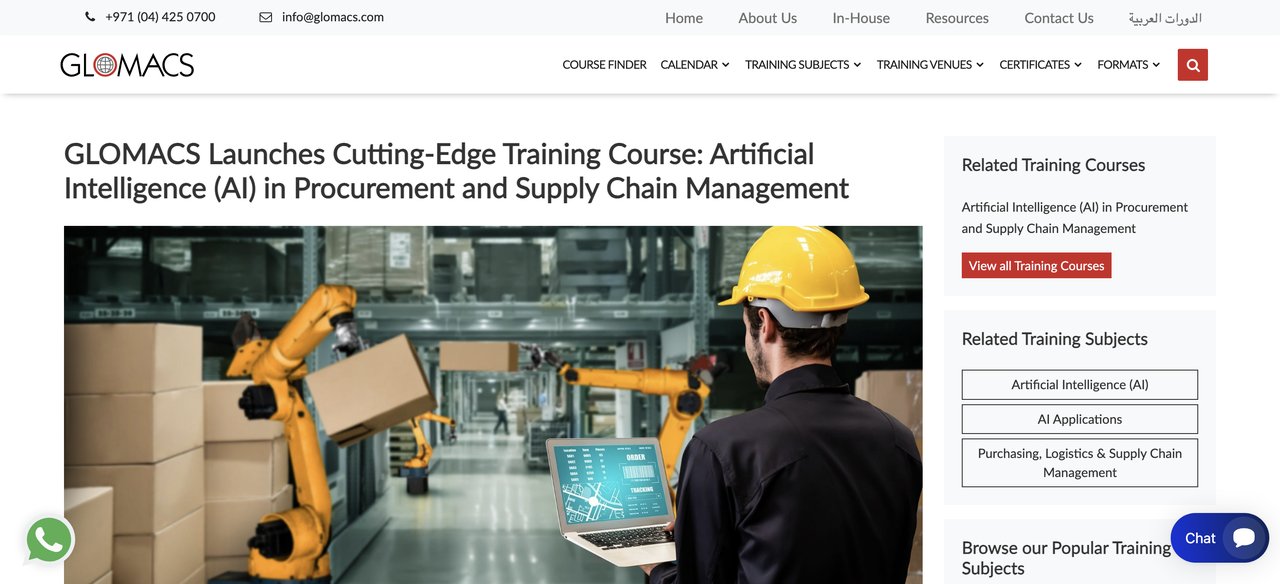
The Artificial Intelligence in Procurement and Supply Chain Management Training Course by GLOMACS is a 5-day interactive training course. It focuses on practical AI applications in procurement and supply chain management, emphasizing strategic thinking and ethical AI adoption. The course is available in various formats, including online and classroom sessions.
Key Topics Covered: Practical AI applications in supplier management, contract optimization, risk reduction, sustainability.
Target Audience and Skill Level Requirements: Procurement and supply chain professionals; suitable for those looking for hands-on exposure to AI tools.
- Pros:
- Enhanced strategic decision-making with AI insights.
- Increased efficiency through automation.
- Optimized supplier relationships via AI analytics.
- Improved risk mitigation and cost reduction strategies.
- Support for sustainability initiatives.
- Cons:
- Higher cost for classroom sessions.
- Short duration (5 days) may limit depth for some topics.
Who Would Benefit Most: Procurement and supply chain professionals seeking a brief, intensive course on practical AI applications.
Overall Recommendations
When choosing an AI course for supply chain management, professionals should consider their specific needs and learning preferences. Complete AI Training offers a comprehensive and affordable option with continuous updates, ideal for those seeking extensive ongoing education. The Certified Generative AI for Supply Chain Management is suited for professionals looking for practical applications with certification. The Strategic AI and Data Science course offers flexibility and strategic insights, while MIT xPRO's program provides a high-impact, reputable learning experience. Finally, the GLOMACS training course is best for those seeking a short, intensive course on AI applications. Each course offers unique advantages, ensuring supply chain managers can find a program that aligns with their career goals and learning style.




